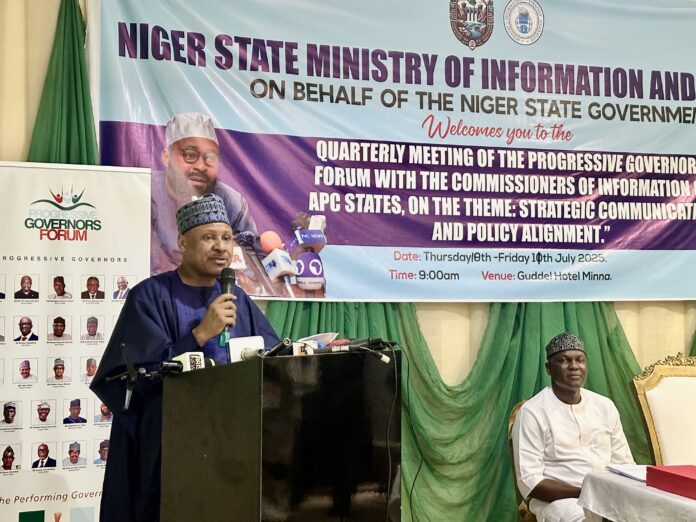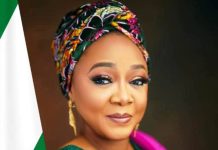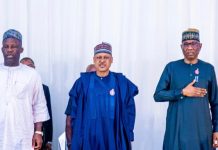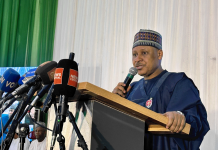SPEECH BY THE HONOURABLE MINISTER OF INFORMATION AND NATIONAL ORIENTATION, MOHAMMED IDRIS, (fnipr), AT THE CONFERENCE OF COMMISSIONERS FOR INFORMATION IN APC STATES ORGANIZED BY THE PROGRESSIVES GOVERNORS’ FORUM, HELD ON THURSDAY, JULY 10, 2025 IN MINNA, NIGER STATE.
Protocols
It is a great honour for me to be here with you today at this important convergence of voices that drive the communication machinery in our great party, the All Progressives Congress. I must begin by commending the Progressive Governors’ Forum, under the visionary leadership of His Excellency, Senator Hope Uzodinma, the Imo State Governor, and his team, for convening this strategic conference of Commissioners for Information across the country.
I wish to express my special gratitude to His Excellency, the Executive Governor of Niger State, Honourable Mohammed Umar Bago, for graciously agreeing to host this critical conference.
I am reliably informed that there has been a series of conferences for Information Managers from APC-controlled states, organized by the Progressive Governors’ Forum – a commendable initiative aimed at fostering synergy and enhancing the communication strategy of our great party.
As a proud son of the soil, it gives me great pleasure to welcome you all to Niger State. I encourage you, after the conclusion of the conference, to take some time to explore and enjoy the serene ambiance and warm hospitality of this beautiful city.
This forum is timely, commendable, and crucial to the mission of amplifying the great work being done by the APC-led administration at both the federal and sub-national levels.
The purpose of this conference reflects a recognition of a shared responsibility of effectively communicating the goals, achievements, and promises of our Renewed Hope Agenda to every citizen in every community across the country.
Distinguished colleagues, permit me to re-emphasize that President Bola Ahmed Tinubu, GCFR, did not embark on his presidential campaign with lofty slogans. He presented to Nigerians a well-thought-out Eight-Point Renewed Hope Agenda, which is a blueprint for economic revitalization, national development, and inclusive growth. That agenda is now being steadily implemented across Ministries, Departments, and Agencies, with discipline, prudence, fortitude, and a deep commitment to the welfare of Nigerians.
One of the boldest and most consequential decisions of this administration, which is the removal of the fuel subsidy, was a painful but necessary reform. Beyond saving the economy from fiscal collapse, this decision has significantly blocked areas of leakage and waste in our economy, thereby leading to an increase in funding for the development of mega infrastructure such as the Lagos-Calabar Coastal Superhighway, Sokoto-Badagry Superhighway, Calabar-Abuja Super Highway, Kaduna-Kano Standard Gauge Railway, Abuja-Kaduna-Kano Expressway, among others.
We are also witnessing steady investment in the provision of social services and the increase in monthly allocations to state governments, which is enabling them to embark on projects that are already having transformative impacts across sectors – from roads to schools, hospitals to agriculture.
But the Renewed Hope Agenda goes beyond macroeconomic reforms. It is about creating concrete opportunities for prosperity across sectors – for individuals, for families, and for communities.
Let me draw your attention to some of the flagship initiatives of the Tinubu administration, which every Commissioner for Information here should not only understand deeply but also communicate strategically to their states and constituents:
1. Empowerment and Access to Capital
Over 900,000 Nigerians have already benefited from the Presidential Conditional Grant and Loan Scheme, supporting small businesses, traders, artisans, and young entrepreneurs.
Over 300,000 students are currently benefiting from the unprecedented Students’ Loan Scheme, ensuring that no young Nigerian is denied access to higher education because of a lack of funds.
The Bank of Agriculture is being recapitalized to the tune of ₦1.5 trillion, unlocking financing for farmers, agripreneurs, and the agro-industrial value chain.
2. Sector-Specific Growth Drivers:
• The creation of the Ministry of Livestock Development by President Bola Ahmed Tinubu is a visionary step toward turning a long-neglected sector into a potential ₦30 trillion economy that can create jobs, boost self-sufficiency in dairy and associated products, reduce farmer-herder clashes, and scale up exports as well as foreign exchange earnings.
• The Ministry of Marine and Blue Economy, equally established by the President, leverages Nigeria’s over 800km of coastline and vast inland waterways to grow the fisheries, transport, logistics, and port services sectors, while creating new jobs and revenue streams.
3. Regional and Local Development
• The establishment of Regional Development Commissions – for the North Central, North West, South East, South West, and South South- is aimed at driving integrated, context-specific development across Nigeria’s six geopolitical zones.
• The push for local government autonomy will unlock development at the grassroots, improve service delivery, and restore public confidence in governance at the lowest tier.
4. Strategic Investments in Energy and Infrastructure
• The President has demonstrated unwavering commitment to energy security and economic inclusion especially in the northern part of the country with the renewal of key licences for the Kolmani Integrated Oil Development Project in Bauchi State and the sustained momentum behind the Ajaokuta–Kaduna–Kano (AKK) Gas Pipeline, which has now crossed the River Niger.
• The AKK Gas Pipeline is progressing steadily alongside the Obiafu–Obrikom–Oben (OB3) Gas Pipeline project, both of which form integral components of the Trans-Nigeria Pipeline Project.
• Inaugurated projects like the ANOH and AHL Gas Processing Plants will supply over 500 million standard cubic feet of gas daily – a 25% increase in domestic supply, energizing homes, industries, and innovation hubs.
• The groundbreaking of five mini LNG plants in Ajaokuta by NNPC and private investors will bolster Nigeria’s energy mix and provide affordable energy for industrial and domestic use.
• The administration has also mainstreamed Compressed Natural Gas (CNG) into our energy strategy, attracting over $500 million in private investment, with massive opportunities for state governments in mass transit and industry.
5. Skills, Youth, and Innovation
• The ₦75 billion BOI/FGN Fund is supporting MSMEs across all sectors.
The ₦120 billion dedicated to Technical Vocational Education and Training and the Skill-Up Artisans Initiative is targeting the empowerment of 10 million artisans nationwide.
• The 3MTT Project (Three Million Technical Talent) is upskilling young Nigerians in tech and digital tools. Only a few days ago, the Honourable Minister of Communications and Digital Economy, Dr. Bosun Tijani, commissioned the 3MTT hub in Kano.
• The Labour Employment and Employment Programme (LEEP) is being implemented to target 2.5 million youth for employment and enterprise training.
The National Talent Export Programme is positioned to create 1 million jobs by exporting Nigerian skills to the global market.
• In the creative sector, the Creative Economy Development Fund (CEDF) offers up to $100,000 in funding for businesses, while the Nigeria Youth Investment Fund (NYIF), now restructured, provides ₦500,000 to ₦2,000,000 to young entrepreneurs.
• The i-DICE Programme supports innovation in digital and creative industries for youth aged 15–35.
Ladies and gentlemen, my dear colleagues, these are not just abstract numbers or policy points. They are opportunities – real, measurable opportunities for every Nigerian.
It is therefore our duty, as information managers, to ensure that the citizens of this country, across all the states of the Federation, not only know about these reforms and programmes but also understand how to access and benefit from them.
That is why this conference is so important. As Commissioners for Information, you are the voice and face of government at the state level. You must go back home with renewed energy, armed with facts, stories, and strategies to effectively mobilize your people to take full advantage of the promise of Renewed Hope.
I encourage you to build synergy and leverage platforms like the National Orientation Agency (NOA), explore data-driven campaigns, and engage directly with community leaders, traditional rulers, youth organizations, and market associations.
Let me re-emphasize that President Bola Ahmed Tinubu is keeping faith with Nigerians. You now must translate that faith into hope and action at the grassroots.
Let me conclude by reaffirming the commitment of the Federal Ministry of Information and National Orientation to supporting your work. We are making huge investments in public information and communication infrastructure across the country, retooling the NOA for greater community engagement, and ramping up national campaigns on thematic areas that align with our shared goals.
Together, let us ensure that the message of Renewed Hope is shared across the country for Nigerians to benefit from Mr. President’s Agenda.
Thank you, and God bless the Federal Republic of Nigeria.
God bless the All Progressives Congress.
Mohammed Idris, fnipr
Honourable Minister of Information and National Orientation






